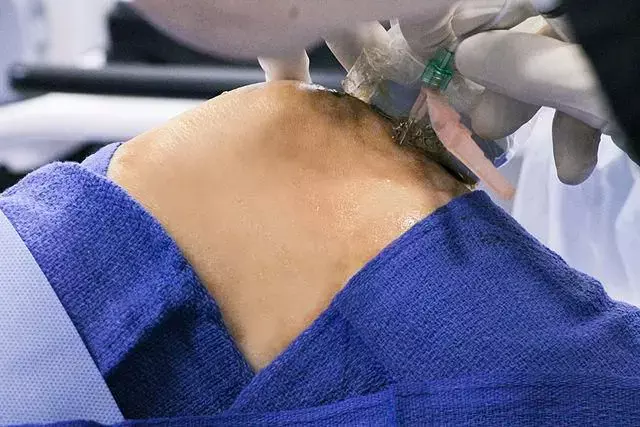- Home
- Medical news & Guidelines
- Anesthesiology
- Cardiology and CTVS
- Critical Care
- Dentistry
- Dermatology
- Diabetes and Endocrinology
- ENT
- Gastroenterology
- Medicine
- Nephrology
- Neurology
- Obstretics-Gynaecology
- Oncology
- Ophthalmology
- Orthopaedics
- Pediatrics-Neonatology
- Psychiatry
- Pulmonology
- Radiology
- Surgery
- Urology
- Laboratory Medicine
- Diet
- Nursing
- Paramedical
- Physiotherapy
- Health news
- Fact Check
- Bone Health Fact Check
- Brain Health Fact Check
- Cancer Related Fact Check
- Child Care Fact Check
- Dental and oral health fact check
- Diabetes and metabolic health fact check
- Diet and Nutrition Fact Check
- Eye and ENT Care Fact Check
- Fitness fact check
- Gut health fact check
- Heart health fact check
- Kidney health fact check
- Medical education fact check
- Men's health fact check
- Respiratory fact check
- Skin and hair care fact check
- Vaccine and Immunization fact check
- Women's health fact check
- AYUSH
- State News
- Andaman and Nicobar Islands
- Andhra Pradesh
- Arunachal Pradesh
- Assam
- Bihar
- Chandigarh
- Chattisgarh
- Dadra and Nagar Haveli
- Daman and Diu
- Delhi
- Goa
- Gujarat
- Haryana
- Himachal Pradesh
- Jammu & Kashmir
- Jharkhand
- Karnataka
- Kerala
- Ladakh
- Lakshadweep
- Madhya Pradesh
- Maharashtra
- Manipur
- Meghalaya
- Mizoram
- Nagaland
- Odisha
- Puducherry
- Punjab
- Rajasthan
- Sikkim
- Tamil Nadu
- Telangana
- Tripura
- Uttar Pradesh
- Uttrakhand
- West Bengal
- Medical Education
- Industry
Percutaneous periarticular analgesic injection After TKA Relieves Post-operative Pain

Pain management in the early period is one of the most important factors in total knee arthroplasty (TKA) as the intense postoperative pain in the early period after TKA affects patient satisfaction. A recent study suggests that percutaneous periarticular analgesic injection at 1 day after TKA improves postoperative pain. The study findings were published in the Journal of Orthopaedic Surgery and Research on June 01, 2021.
Intraoperative periarticular multi-drug injection has been reported to be effective in many studies as multimodal pain management after TKA. A previous study suggests that the early postoperative pain score at rest after unilateral TKA was lower in patients with the additional percutaneous periarticular multi-drug injection (additional injection). However, there is no information on the efficacy of this additional injection for simultaneous bilateral TKA. Therefore, Dr Takuya Iseki and his team conducted a study to assess the clinical effectiveness of percutaneous periarticular injection at 1 day following simultaneous bilateral TKA.
It was a prospective, single-centre, two-arm, parallel-group, open-label, and randomized controlled study of 44 patients (88 knees) who underwent simultaneous bilateral TKA. The researchers randomly as////signed the patients to receive a percutaneous periarticular injection at 1 day following surgery (n = 22 patients) or no injection (n = 22 patients). In the additional injection group, they injected a solution including methylprednisolone, ropivacaine, and epinephrine into the muscle belly of the vastus medialis at 1 day after surgery. All patients received an intraoperative periarticular multi-drug injection and postoperative intravenous and oral nonsteroidal anti-inflammatory drugs. The major outcome assessed was the postoperative pain at rest measured using a visual analogue scale (VAS) and analyzed with Student's t-test.
Key findings of the study were:
- Upon analysis, the researchers found that compared to the no additional injection group, the additional periarticular injection group had a significantly lower VAS score at
◊ 8:00 PM postoperative day 1,
◊ 6:00 AM postoperative day 2,
◊ 12:00 PM postoperative day 2,
◊ 6:00 AM postoperative day 5,
◊ 12:00 PM postoperative day 5, and
◊ 8:00 PM postoperative day 5.
- They reported a similar rate of complication in both groups.
The authors concluded, "The additional percutaneous periarticular multi-drug injection at 1 day after simultaneous bilateral TKA may reduce early postoperative pain more effectively than no additional injection. This technique may be a new method for postoperative pain control after TKA."
For further information:
Dr Kartikeya Kohli is an Internal Medicine Consultant at Sitaram Bhartia Hospital in Delhi with super speciality training in Nephrology. He has worked with various eminent hospitals like Indraprastha Apollo Hospital, Sir Gangaram Hospital. He holds an MBBS from Kasturba Medical College Manipal, DNB Internal Medicine, Post Graduate Diploma in Clinical Research and Business Development, Fellow DNB Nephrology, MRCP and ECFMG Certification. He has been closely associated with India Medical Association South Delhi Branch and Delhi Medical Association and has been organising continuing medical education programs on their behalf from time to time. Further he has been contributing medical articles for their newsletters as well. He is also associated with electronic media and TV for conduction and presentation of health programs. He has been associated with Medical Dialogues for last 3 years and contributing articles on regular basis.
Dr Kamal Kant Kohli-MBBS, DTCD- a chest specialist with more than 30 years of practice and a flair for writing clinical articles, Dr Kamal Kant Kohli joined Medical Dialogues as a Chief Editor of Medical News. Besides writing articles, as an editor, he proofreads and verifies all the medical content published on Medical Dialogues including those coming from journals, studies,medical conferences,guidelines etc. Email: drkohli@medicaldialogues.in. Contact no. 011-43720751


